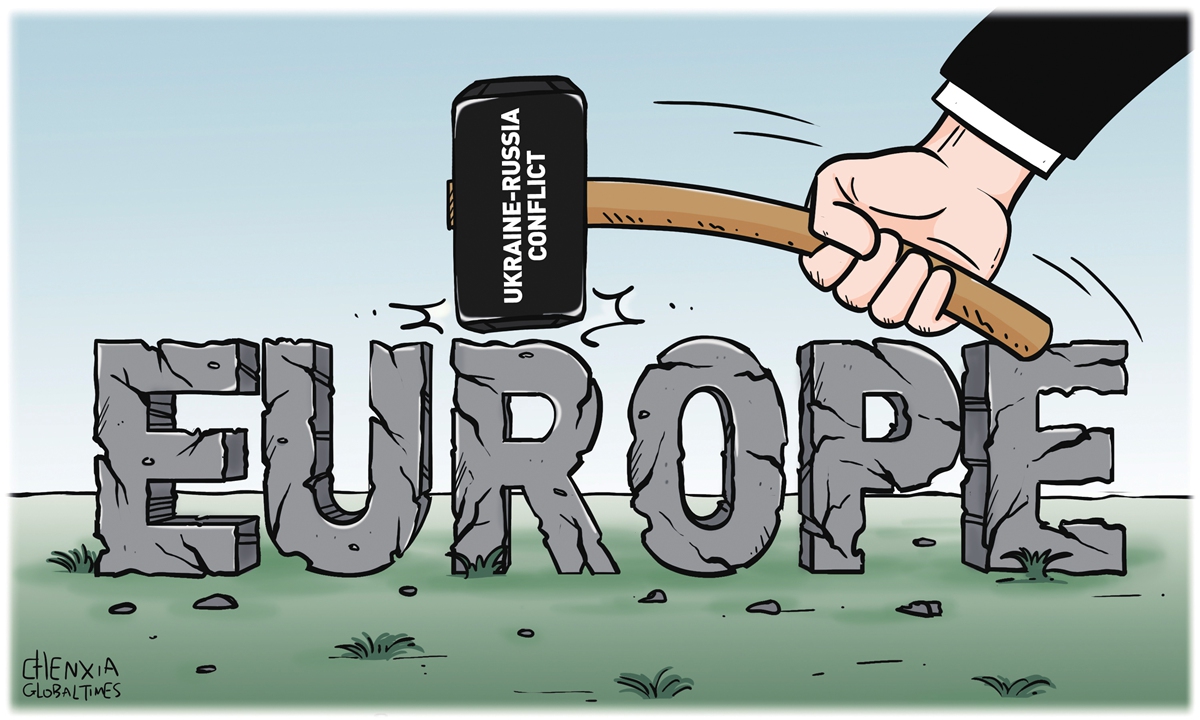
Illustration: Chen Xian/Global Times
Recently, German President Frank-Walter Steinmeier's planned visit to Kiev was reportedly rejected by the Ukrainian government. Steinmeier is a member of the Social Democratic Party of Germany (SPD), which had relatively good relations with Russia in the past. This move allegedly has caused suspicion from the Ukrainian government toward the German leader and the German government.
While the German side felt irritated toward the "aborted" trip, Ukrainian President Volodymyr Zelensky denied receiving a request from the German president.
It seems like a simple diplomatic episode, but has exposed internal divergences of European countries in terms of the Russia-Ukraine conflict. After the outbreak of the conflict, European countries have almost unanimously condemned and sanctioned Russia. From this sense, their words and actions are supposed to win approval from the Ukrainian government. However, the farce behind Steinmeier's visit is telling.
First, given the Nord Stream 2 project, Ukraine believes that Germany and France are partial to Russia. Second, the dialogues haven't been fruitful, and Ukraine questions whether European countries have piled enough pressure on Russia. Third, after US President Joe Biden accused Russia of committing "genocide," leaders from France and Germany did not follow suit. Zelensky said that Emmanuel Macron's refusal to describe the situation in his country as "genocide" was "very hurtful."
Looking back at the escalation of the conflict, European countries are not as united as they seem. There are divergences in their words and actions. Some Eastern European and Baltic countries, which are located close to the conflict zone, tend to support NATO's military presence to guard against the "Russian threat" out of their own national security considerations. In contrast, many countries in western Europe are taking a relatively moderate attitude in their diplomatic stance when discussing Russia. The Ukrainian government expects all European countries to stand firmly on its side, but the reality is cruel. European countries like Germany and France cannot satisfy Ukraine on every matter. Each country has its own interests to consider.
For European countries, there exists a bottom line in condemning and sanctioning Russia, and it is impossible to ignore their own national interests. Germany is dependent on Russia for energy supply and cannot turn a blind eye to its own energy security interests. Similarly, European countries have differences in their attitudes and foreign policy orientations when dealing with the Russia-Ukraine conflict, just as their attitudes toward receiving refugees are different. Setting aside practical interests, differences are unavoidable from the perspective of the historical background of internal divisions in Europe.
The first case in point is Poland. Due to Poland's close proximity to Russia, it has had conflicts with Russia several times in history. So it is not surprising that the Polish government has stood firmly against Russia in the Russia-Ukraine conflict.
The second case is Finland. Also because of its close proximity to Russia, it had been devoured by Russia in history, and is deeply afraid of Russia. Therefore, the ongoing Russia-Ukraine conflict has accelerated the end of Finland's neutral foreign policy, and it is currently preparing to apply to join NATO.
The third case is Germany. The relationship between Germany and Russia used to be warm. The grievances between Germany and Russia were inextricably linked. After the unification of Germany in the 1870s, former chancellor of the German Reich Otto von Bismarck decided to join hands with Russia to counter the UK. Bismarck knew that the long-term interests of the German nation fundamentally contradicted with the interests of the British Empire. Germany lacked survival space and strategic resources, which the UK could not provide while Russia could.
Nonetheless, the then former German emperor Wilhelm II did not follow Bismarck's vision, but made the fatal mistake of attacking Russia. The painful lessons of Germany's failure in the two world wars show that once Germany and Russia are completely opposed to and confront each other, they can only be in a position of being suppressed by the British and American forces.
This lesson remains relevant for Germany today. Being the most powerful industrial manufacturer in Europe, Germany is highly complementary with Russia, a resource-rich country. Once the advantages of Germany and Russia are combined, it will be a nightmare for the British and American forces. Despite the lack of governing experience of the new German government, it is supposed to know these historical laws and lessons.
The conflict between Russia and Ukraine is not only a direct confrontation between the two nations, but also the focus of the game of interests and conflicts among European countries. For some time to come, with the evolution of the war and the escalation of US sanctions against Russia, the contradictions and divisions within Europe will continue. In particular, how to adjust the Germany-Russia relationship and its future direction will be a core factor affecting the European security structure as a whole.
The author is a research fellow with the Institute of European Studies, the Chinese Academy of Social Sciences. opinion@globaltimes.com.cn
